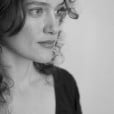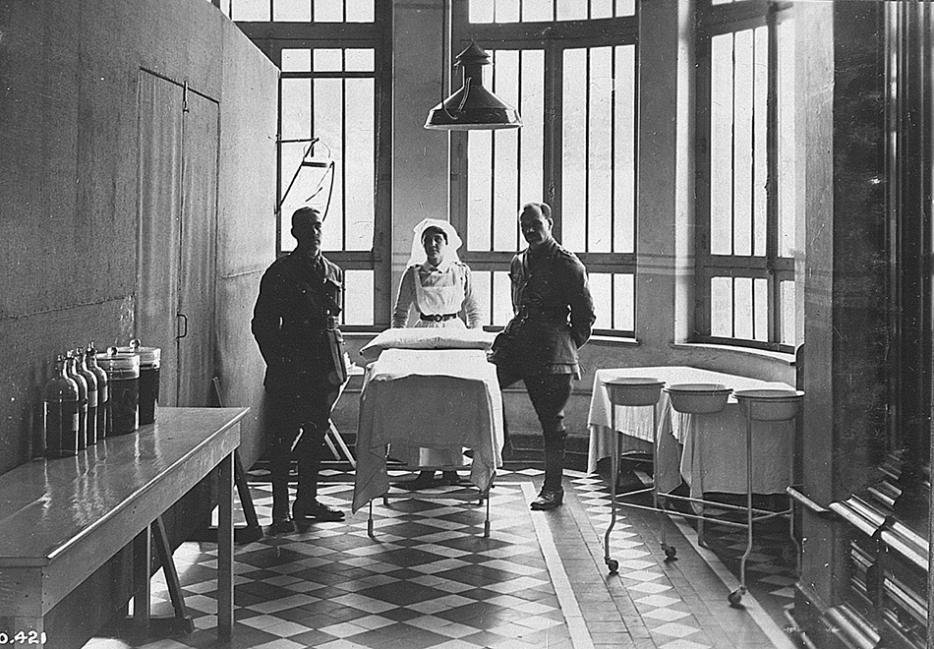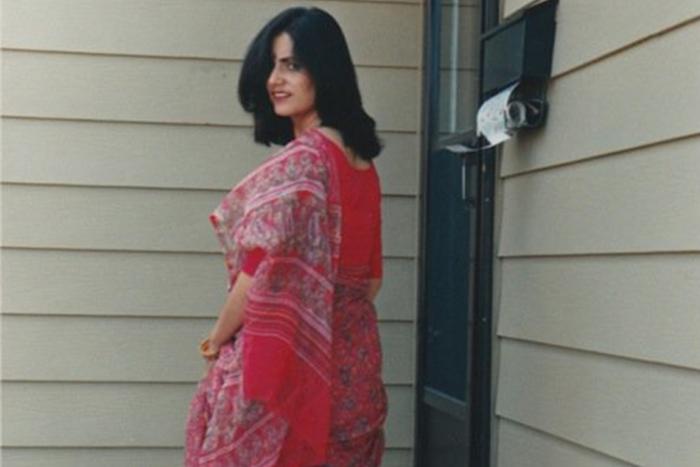Before the Great War, I had a happy childhood in a middle-class Montreal family; the youngest of three girls. My sisters were beautiful, while I was lanky, too tall and odd looking. I didn’t mind being the funny-looking one, though. My father said that I should never go to Africa because a giraffe might fall madly in love with me. I liked the idea of having to explain to a giraffe that we just weren’t suited to each other, and how he wouldn’t be able to fit through my doorway at home.
Once, I took my doll to an old toy maker on St. Laurent to be repaired. In his workroom there were drawers filled with glass eyes, and tiny limbs hanging from hooks on the wall. The toy maker found a porcelain leg that matched. He cut away my doll’s clothes and amputated the damaged leg; then he attached the new one with wires and glued the cloth bloomer on top of it. I loved the tenderness with which he handled my doll. He let me stand next to him while he worked and whisper comforting words in the doll’s ear, telling her that she would be as good as new.
How amazing to be a real doctor and to save lives, I thought. It was an art to fix broken bodies, wasn’t it? It must involve so much kindness. But being a doctor wasn’t something a girl did, was it?
As I got older, I wasn’t interested in starting a family the way my sisters had. I enrolled in the nursing school at Montreal General Hospital. It shocked my family, but they realized I would be hopeless at finding a husband, so they let me be. And then we went to war. I knew that I needed to play my part somehow. My nurse’s certificate was my ticket to participate, and I signed on.
My whole family came to see me off at the train station. My father had once said that the only advantage to having girls was that he would never have to send one of his children to war. And here I was, going voluntarily.
In Halifax, the other nurses and I boarded a ship with the soldiers. It was part of a larger fleet that would be crossing the ocean. I loved my uniform, a blue dress with a wide bib and a voluminous apron. All the soldiers called us “bluebirds,” which made me feel beautiful inside.
We were nervous and confused yet wild at heart as we crossed the Atlantic. When we arrived at the Port of Plymouth, it seemed as if all of England had come to welcome us. There was a band playing. Everyone was cheering. The Canadians! they called out, as though we were mythical creatures. They couldn’t quite believe that we had come all this way to help them. We couldn’t quite believe it ourselves.
Waves crashed on the shore beneath us, as if everyone in England had emptied out jars of pennies on the sand. Everybody had told me over and over that there was no way that a girl could make a difference in this world. But as I stepped off the ship, I thought, Here I am in a history book!
*
The casualty clearing station in France was nothing that I was prepared for. It was in Blangy right next to the fighting during the Battle of Arras. I had to run between the operating tents in my rubber boots, my feet sinking into the mud. It was as though hands were grabbing my ankles, trying to get me to save them with every step. I knew that I was walking on mud and rocks and branches, but I felt like I was stepping on bodies and crushing bones. Every explosion was a hot breath on my neck. The rain tasted like sweat and blood.
The battles had stomped out every flower and blade of grass, every bit of life. There were only boys who were trying to stay alive. The doctors relied on us for all the most terrible surgeries. Body parts were everywhere. The enormity of it was so overwhelming that I couldn’t logically grasp it. I stared at the limbs as though I were back at the toy maker’s workshop on St. Laurent. Nothing was real. I just had to work and work and work, whether it made sense or not.
When I was finally told to take a rest on my tiny cot, I was too tired to take my clothes off, too exhausted to be bothered by the rats running under my bed. I knew that I had given everything that I had. I could no longer stand up. I cried in my sleep, because it was the only time I could afford to.
*
When I was stationed in the hospital in England, I pleaded at the quartermaster’s store to get the last miraculous can of pineapples so I could share it with a very pale-looking soldier. He had such big brown eyes that they made him look only 12 years old.
There was a boy with shell shock who felt safe only under his bed. There was another writing a letter to his sweetheart with his left hand now that his right one had been blown off. One boy was reciting a poem. He said that he had to practise it because it was part of his school exam. He wanted to win a scholarship to study at university. He whispered the poem as though it were the only thing keeping him alive.
At night the injured soldiers begged me to tell my own stories, to “never mind Sir Walter Scott.”
I would tell them about a strange girl named Ida who had a pet fox. Ida had long red hair and wore a fur coat fashioned from the rabbits that she and the fox had roasted by fires at midnight. She was very beautiful and travelled with her fox companion, sneaking into kitchens and stealing eggs from the pantries. People would wake up planning to have poached eggs for breakfast only to find the pantry was bare.
There was a policeman who was madly in love with Ida and always on her trail. She had left him at the altar, bolting away only seconds after she had said “I do.” They had never consummated the marriage and he was determined to find her and make her his proper wife.
The hospital minister said that he knew in his heart that these stories were entirely inappropriate. And then he told me to please continue.
There was a nurse from Manitoba who had such a pretty singing voice. All the young soldiers would beg her to sing. She sang Florrie Forde songs, putting her arms akimbo and shouting the tunes as though she were scolding angry children. It was as if we were in a concert hall listening to the real thing.
There was another nurse who had such long hair that whenever an alarm sounded we would all help her braid it. There was a nurse from British Columbia who would laugh at everybody’s jokes. She was always talking about the boy named Stephen who got away. She told us so much about the boy that in the end we were all heartbroken by him.
In 1917 we found out that nurses and women in the armed services would be the first women in Canada to get the vote. A nurse named Mary, who’d been in a suffrage group in her hometown, kept saying, “We’ve shown the whole of Canada that we’re as brave as the boys. There’s no one that would dare say that we nurses can’t speak for ourselves.”
All us nurses danced around excitedly when we heard the news. Back in Montreal I had believed that it was my eccentricities that had made me dissatisfied. But now I realized that there were girls just like me all over the country. And the reason we felt stifled was not that we were peculiar. We were quite healthy and brilliant, and we were reacting against the confines of an undemocratic and unjust society.
Although the end of the war was not yet in sight, we girls knew we had won a great victory.
*
I rather took to being on a hospital ship. In 1918 I was stationed on HMHS Llandovery Castle. What a name! I liked to watch the sun set from the deck. The clouds turned themselves a wild sort of pink, the colour of cotton candy at a fair. The sun poured kerosene and lit itself on fire. Then, like a ball of flame into the mouth of a sword swallower, it disappeared into the ocean and was extinguished. What a strange, enigmatic world. What a ceiling under whose glory we all strive to do what good we can.
When the sun went down, the lights on the ship would come on. There was a huge electric cross over the bridge, and strings of white and green lights hanging on either side. I always found they lit up ship so prettily, like we were at a garden party, but it was done so that nobody could mistake us for a warship.
Anybody could see the red crosses painted on either side and know that it was a hospital ship, and that there was no one on board who would be fighting any time soon; just a lot of sad broken boys dreaming about home, a bunch of funny-looking nurses dressed in our blue uniforms and doctors listening to heartbeats. The enemy wasn’t allowed to fire at us. We were meant to feel safe while we were at sea.
Still, as we sailed across the waters, I could sense the submarines that swam deep, deep, deep beneath us. They were like sea monsters from old fairy tales. I thought of the giant squid I had seen in a picture book in Montreal that would stretch its big tentacles around ships and pull them underneath the waves.
It was the middle of the night when a torpedo struck our ship and knocked me out of my cot. As alarm bells rang I ran onto the deck in just my nightgown. The ship was sinking. This was how it was going to end for me, was it? I followed a group of nurses onto a lifeboat. We went quietly. There was nothing that anybody could do. There was nothing to yell about.
We were doomed. The submarine was not going to let us go peacefully. It surfaced and rammed into the lifeboats and, to our shock, began machine-gunning the survivors. They were going to destroy all of us. There was a terrible whirlpool and my lifeboat was being drawn to it.
The matron asked the sergeant whether there was any hope for any of us.
“No,” was all he said.
I was so filled with fear that I thought my head would explode. These were my last moments and I was panicking, not knowing what I was supposed to think about. I tried to remember my family’s faces, but I could only imagine them screaming. When I went under the water, there was the noise of the whole world rushing down a drain and then all at once everything was quiet. I felt weightless and perfectly calm. They say that there is a moment right before you drown when you are supposed to feel at peace.
There were nurses on either side of me who were already dead. Their enormous skirts had lifted up over their heads, making them look as if they had on parachutes. I had always wondered what it must feel like when the men jumped out of the planes with their parachutes in packsacks on their backs. I had spent my whole life wondering about everything. And here I was in the middle of the ocean in my nightgown like a little girl who had woken up in the middle of the night and was asking for a glass of milk.






